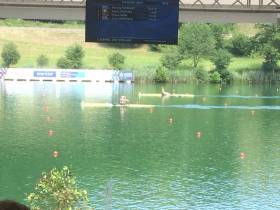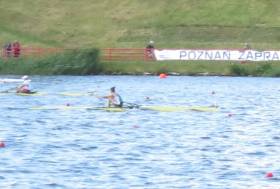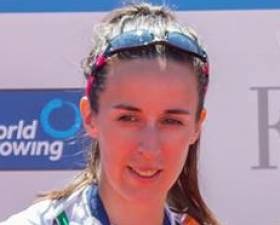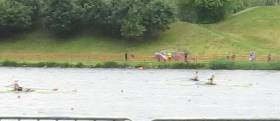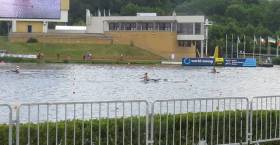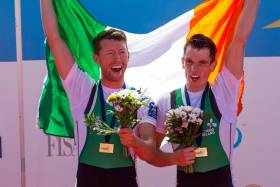Displaying items by tag: World Cup
Puspure and Dukarska Race into Lucerne Quarter-Finals
#Rowing: Monika Dukarska and Sanita Puspure both qualified for the quarter-finals of the women’s single sculls at the World Cup regatta in Lucerne today.
Dukarska drew Magdalena Lobnig, the holder of the world’s best time in the event, in her heat. The Killorglin woman stuck with the Austrian as others let her go and finished second.
Puspure also took second in her heat, refusing to let Britain’s Victoria Thornley dominate the race. The two matched each other over the final stages, though both eased up coming to the line, with Thornley taking the victory by two seconds.
World Cup Regatta, Lucerne, Day One (Irish interest)
Women
Single Sculls (Three to Quarter-Finals; rest to quarters or E Final)
Heat Three: 1 Austria (M Lobnig) 7:46.97, 2 Ireland Two (M Dukarska) 7:51.44, 3 Latvia (E Gulbe) 8:02.20.
Heat Five: 1 Britain (V Thornley) 7:45.65, 2 Ireland One (S Puspure) 7:47.84, 3 Finland (E Karppinen) 7:58.04.
Ireland Go For Gold at World Rowing Cup in Lucerne
#Rowing: The third and final World Rowing Cup regatta of the 2017 season will take place in Lucerne, Switzerland on the famous Rotsee course, beginning this Friday, July 7th.
The regatta is the last chance for athletes to test themselves before the main event of the year, the 2017 World Rowing Championships, which will be held in Florida in September and October.
The World Cup regatta has an entry of almost 700 competitors from 54 counties. The waters of the Rotsee are ideal for competitive rowing as the lake’s size and shape enable Olympic-style six-lane racing over 2,000 metres. It is arguably the fairest course in the world.
The World Cup series consists of a series of three events, with the overall World Rowing Cup winners being determined after the third event. The events in which competitors can be World Cup champions mirror those at the Olympic Games.
Gary and Paul O’Donovan took silver at the second World Cup in Poznan. They had finished fourth in the first World Cup in Belgrade and are in contention to become overall winners of this World Cup event. Shane O’Driscoll and Mark O’Donovan won gold in the lightweight pair, an international event, at the first World Cup in Belgrade and the second in Poznan. Lightweight single sculler Denise Walsh, who is not travelling to Lucerne, took silver in Belgrade.
The Ireland team is:
Lightweight Men’s Double Sculls: Gary O’Donovan (Skibbereen RC), Paul O’Donovan (Skibbereen RC)
Lightweight Men’s Pair: Mark O’Donovan (Skibbereen RC), Shane O’ Driscoll (Skibbereen RC)
Women’s Single Sculls: Sanita Puspure (Old Collegians BC); Monika Dukarska (Killorglin RC)
Dukarska Chosen in Ireland Team for Final World Cup
#Rowing: Monika Dukarska has been chosen to represent Ireland at the third World Cup Regatta in Lucerne early next month. The Killorglin woman finished ninth (third in the B Final) on her first foray as a single sculler at a World Cup event, in Poznan in Poland last weekend. She joins Sanita Puspure, who won the B Final in Poland. The Ireland lightweight pair of Shane O’Driscoll and Mark O’Donovan, who have taken gold in the previous two World Cups and in the European Championships will hope to continue their run. The lightweight double of Paul and Gary O’Donovan were silver medallists at the Europeans and in the World Cup in Poznan.
O'Donovans Sprint to Silver at World Cup Rowing
#Rowing: Paul O’Donovan and Gary O’Donovan took a silver medal at the World Cup Regatta in Poland this morning. The Ireland lightweight double took second in an exciting race. France led from early on and were never headed. Ireland came from sixth to hold second by 1500 metres – but coming up to the line they came under severe pressure from China and Poland, who took the bronze.
World Cup Regatta, Poznan, Poland, Day Three (Selected results; Irish interest)
Men
Lightweight Double Sculls – A Final: 1 France (P Houin, J Azou) 6:12.40, 2 Ireland (G O’Donovan, P O’Donovan) 6:15.33, 3 Poland (J Kowalski, M Janknowski) 6:15.90; 4 China One 6:16.17, 5 Germany 6:17.67, 6 Japan Two 6:17.99.
Women
Pair – B Final: 1 United States 7:22.54, 2 Ireland (A Keogh, A Crowley) 7:30.09.
Single Sculls – B Final: 1 Ireland One (S Puspure) 7:28.79, 2 United States Two (M O’Leary) 7:29.35, 3 Ireland Two (M Dukarska) 7:32.34; 4 Germany Two 7:36.36, 5 United States One 7:37.43, 6 Austria Two 7:40.21.
Gold for O'Donovan and O'Driscoll at World Cup Rowing
#Rowing: Ireland’s Mark O’Donovan and Shane O’Driscoll resisted a strong challenge by Britain to take gold in the lightweight pair at the World Cup Regatta in Poznan, Poland.
The Irish started well and led through halfway and the 1500 metres mark. Britain’s Sam Scrimgeour and Joel Cassells kept the pressure on and lost by under a length. Brazil took bronze in this three-boat race.
World Cup Regatta, Poznan, Day Two (Irish interest; selected results)
Men
Lightweight Pair – Final: 1 Ireland (M O’Donovan, S O’Driscoll) 6:32.93, 2 Britain (J Cassells, S Scrimgeour) 6:34.17, 3 Brazil 6:37.21.
Women
Pair – Repechage (First Four to A Final; rest to B Final): Australia 7:15.41, 2 New Zealand 7:16.26, 3 Chile 7:17.86, 4 Britain 7:22.94; 5 United States Two 7:28.76, 6 Ireland (A Keogh, A Crowley) 7:35.93.
Single Sculls – Semi-Finals (First Three to A Final; rest to B Final)
Semi-Final One: 1 Austria (M Lobnig) 7:29.08, 2 China (J Duan) 7:31.25, 3 New Zealand (H Osborne) 7:32.80; 4 Ireland One (S Puspure) 7:35.99, 5 Austria Two 7:42.16, 6 Germany Two 7:49.93.
Semi-Final Two: 1 Britain (V Thornley) 7:29.58, 2 Germany (A Thiele) 7:33.43, 3 Ukraine (D Dymchenko) 7:35.50; 4 Ireland Two (M Dukarska) 7:37.19, 5 United States One 7:38.05, 6 United States Two 7:42.84.
Lightweight Single Sculls – Semi-Finals (Three to A Final; rest to B Final) – Semi-Final One: 1 New Zealand 7:44.06, 2 Poland 7:45.45, 3 Switzerland 7:48.27.
Semi-Final Two: 1 Sweden (E Fredh) 7:40.68, 2 United States (M Jones) 7:41.38, 3 Ireland (D Walsh) 7:42.79; 4 Russia 7:44.47, 5 Netherlands 7:51.60, 6 Austria 7:58.54.
A Final: 1 New Zealand 7:36.89, 2 Poland 7:37.19, 3 Switzerland 7:37.20; 4 Sweden 7:37.75, 5 United States 7:43.07, 6 Ireland (Walsh) 7:48.91.
Sixth For Walsh in Remarkable Rowing Final
#Rowing: Denise Walsh finished sixth in the A Final of the lightweight single sculls here at Poznan, Poland. Joanna Dorociak of Poland, surprisingly, led for most of the race, but it was Jackie Kiddle of New Zealand who came through and won in an exciting finish. Patricia Merz of Switzerland was third, just over half a second ahead of European champion Emma Fredh of Sweden.
Walsh was fell off the pace by halfway and could not make it up in a fast World Cup final.
World Cup Regatta, Poznan, Day Two (Irish interest; selected results)
Women
Pair – Repechage (First Four to A Final; rest to B Final): Australia 7:15.41, 2 New Zealand 7:16.26, 3 Chile 7:17.86, 4 Britain 7:22.94; 5 United States Two 7:28.76, 6 Ireland (A Keogh, A Crowley) 7:35.93.
Single Sculls – Semi-Finals (First Three to A Final; rest to B Final)
Semi-Final One: 1 Austria (M Lobnig) 7:29.08, 2 China (J Duan) 7:31.25, 3 New Zealand (H Osborne) 7:32.80; 4 Ireland One (S Puspure) 7:35.99, 5 Austria Two 7:42.16, 6 Germany Two 7:49.93.
Semi-Final Two: 1 Britain (V Thornley) 7:29.58, 2 Germany (A Thiele) 7:33.43, 3 Ukraine (D Dymchenko) 7:35.50; 4 Ireland Two (M Dukarska) 7:37.19, 5 United States One 7:38.05, 6 United States Two 7:42.84.
Lightweight Single Sculls – Semi-Finals (Three to A Final; rest to B Final) – Semi-Final One: 1 New Zealand 7:44.06, 2 Poland 7:45.45, 3 Switzerland 7:48.27.
Semi-Final Two: 1 Sweden (E Fredh) 7:40.68, 2 United States (M Jones) 7:41.38, 3 Ireland (D Walsh) 7:42.79; 4 Russia 7:44.47, 5 Netherlands 7:51.60, 6 Austria 7:58.54.
A Final: 1 New Zealand 7:36.89, 2 Poland 7:37.19, 3 Switzerland 7:37.20; 4 Sweden 7:37.75, 5 United States 7:43.07, 6 Ireland (Walsh) 7:48.91.
Walsh Qualifies for A Final in Tight Race
#Rowing: Denise Walsh qualifed for the A Final of the lightweight single sculls by finishing third in her semi-final at the World Cup Regatta in Poznan, Poland, today. Emma Fredh and Walsh battled with Mary Jones of the United States for the crucial top-three spots. Jones took over in second to Fredh at 1500 metres, with Walsh holding off Russia’s Anastasia Lebedeva for third. Walsh sprinted from there, but so did Jones, who took second.
Aifric Keogh and Aileen Crowley finished sixth in the pairs repechage, off the pace in a fast race. They will go to the B Final.
World Cup Regatta, Poznan, Day Two (Irish interest; selected results)
Women
Pair – Repechage (First Four to A Final; rest to B Final): Australia 7:15.41, 2 New Zealand 7:16.26, 3 Chile 7:17.86, 4 Britain 7:22.94; 5 United States Two 7:28.76, 6 Ireland (A Keogh, A Crowley) 7:35.93.
Lightweight Single Sculls – Semi-Finals (Three to A Final; rest to B Final) – Semi-Final One: 1 New Zealand 7:44.06, 2 Poland 7:45.45, 3 Switzerland 7:48.27.
Semi-Final Two: 1 Sweden (E Fredh) 7:40.68, 2 United States (M Jones) 7:41.38, 3 Ireland (D Walsh) 7:42.79; 4 Russia 7:44.47, 5 Netherlands 7:51.60, 6 Austria 7:58.54.
Ireland Lightweight Pair Continue Winning Ways
#Rowing: Mark O’Donovan and Shane O’Driscoll won their test race of the lightweight pair at the World Cup Regatta in Poznan, Poland this morning. Britain tested them through three-quarters of the race, but held off when it was clear they would again have to give way to the men in green.
Sanita Puspure and Monika Dukarska finished third and fourth in their heat and missed out on direct qualification in the heats of the women’s single sculls. New Zealand’s Hannah Osborne won a battle with Puspure to take second behind the dominant Vicky Thornley of Britain.
The Ireland pair of Aifric Keogh and Aileen Crowley took fourth in their heat.
Walsh Holds of Pole To Take Place in World Cup Semi-Finals
#Rowing: Denise Walsh took a fine second place in her heat of the lightweight single sculls to qualify directly for the semi-finals of the World Cup Regatta in Poznan, Poland, today. Patricia Merz of Switzerland won, while the Skibbereen woman held off a challenge by Joanna Dorociak of Poland, who will compete in a repechage.
The heat was the fastest of three in tailwind conditions. Emma Fredh of Sweden and newcomer Jackie Kiddle of New Zealand won the other heats.
World Cup Regatta, Poznan, Poland, Day One (Selected Results; Irish interest)
Women
Lightweight Single Sculls Heats (First Two to A/B Semi-Finals; rest to Repechages – Heat One: 1 New Zealand (J Kiddle) 7:30.91, 2 Russia (A Lebedeva) 7:31.79. Heat Two: 1 Sweden One (E Fredh) 7:33.26, 2 Germany (L Pieper) 7:41.81. Heat Three: 1 Switzerland (P Merz) 7:29.28, 2 Ireland (D Walsh) 7:32.72; 3 Poland One 7:36.38.
Strong Ireland Rowing Team Takes on World Cup Challenge
#Rowing: The 2017 World Cup series heads to Poznan, Poland for the second of three regattas in 2017. Almost 500 athletes will compete from 39 countries with several countries, including Australia, China and New Zealand, arriving on the international scene for the first time this season. The event will be staged from 16th-18th June 2017 on Lake Malta, near the city centre of Poznan.
The Olympic gold and silver medallists from the lightweight men’s double sculls are back racing each other again. France’s Jeremie Azou and Pierre Houin and the O’Donovan brothers from Ireland met last month at the European Rowing Championships with the Olympic order staying the same. Both of these talented crews will race strong opposition from Poland and Great Britain.
The Irish team in full to compete at the event is as follows:
Lightweight men’s double sculls: Gary O’Donovan (Skibbereen Rowing Club), Paul O’Donovan (UCD Boat Club)
Lightweight men’s pair: Mark O’Donovan (Skibbereen Rowing Club), Shane O’Driscoll (Skibbereen Rowing Club)
Women’s single sculls: Sanita Puspure (Old Collegians Boat Club) and also Monika Dukarska (Killorglin Rowing Club)
Lightweight women’s single sculls: Denise Walsh (Skibbereen RC)
Women’s pair: Aileen Crowley (UCD BC), Aifric Keogh (UCC RC)
Ireland will also be sending three para-athletes to Poznan, for classification only, with the view to building a Team for the 2018 season; Marianne Watchorn (Trinity), Aaron Stokes (Castleconnell) and Damien Dulea from Quintin RC in London, originally from Cork. Poznan will be the first World Rowing event where Para-Rowing is raced on the same “field of play” at 2’000 metres following the decision taken at the FISA Extraordinary Congress last February in Tokyo.
Racing begins on Friday 16th June with heats for the para-rowing boat classes. Racing then moves on to World Cup and International boat classes, progressing through repechages, semifinals and on to the finals. The first finals will be raced on Saturday afternoon 17th June starting with the para-rowing finals, followed by International boat class finals. World Cup finals will take place on Sunday 18th June.



























